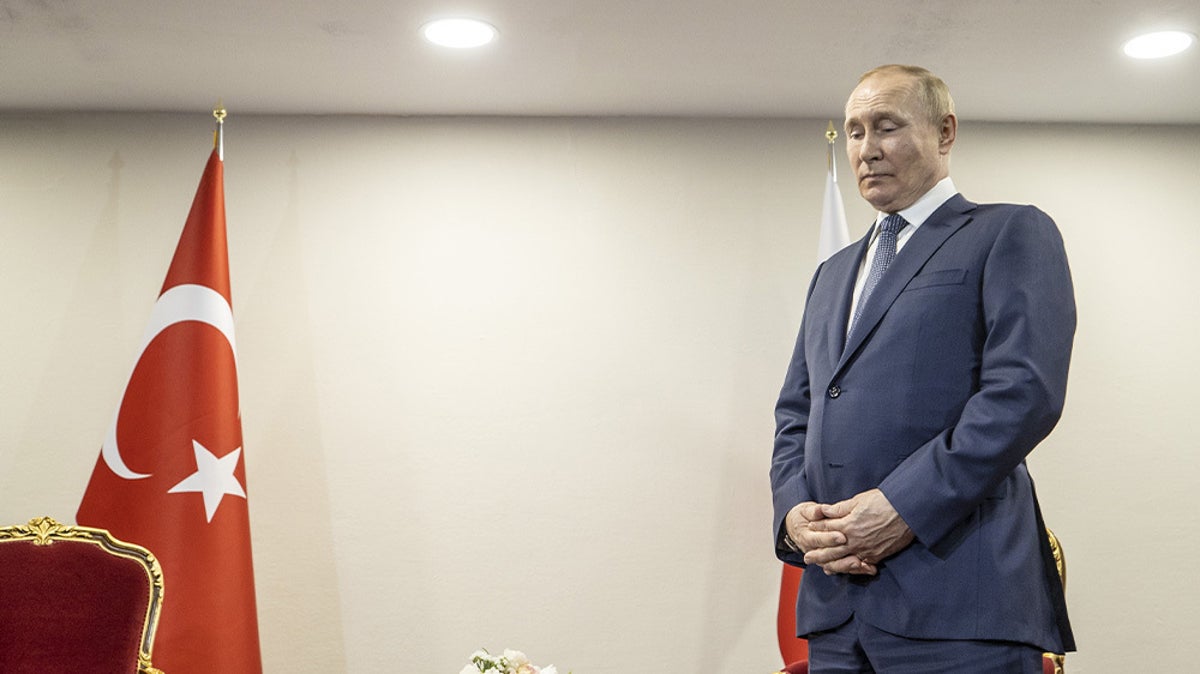
Turkey’s president kept Russia’s Vladmir Putin waiting alone for an awkward minute that was captured on video and made waves across the world as an illustration of shifting power between Ankara and Moscow.
Recep Tayyip Erdogan and Mr Putin, both nationalistic autocrats, were in Tehran for a three-way summit with their Iranian hosts to discuss Syria and other security and economic matters, including the ongoing Russian war against Ukraine.
The summit, officially part of a series of talks over the future of Syria, was unofficially a diplomatic counterpoint to US president Joe Biden’s recent visits to Israel and Saudi Arabia.
In several joint statements and press appearances, there was little evidence of any breakthroughs on regional matters, including a proposal to allow eastern European food out of the Black Sea conflict zone and to world markets. But each leader could claim a measure of success.
Turkey underscored its diplomatic heft as an associate member of several regional geopolitical axes. Both Iran and Russia solidified a partnership that has rankled the west, especially Washington.
“Whether President Putin’s trip furthered any of his key objectives in Ukraine, Syria, or elsewhere remains to be seen,” The Soufan Group, an intelligence and security advisory firm, wrote in a note distributed to subscribers. “However, the Russian leader was able to demonstrate that US efforts to ostracise and isolate him in the region have been unsuccessful.”
Each nation had its own reason for attending the summit, which concluded late on Tuesday. Both Iran and Russia seek to highlight their partnership at a time when the US is seeking to isolate both. Turkey sought to convince Iran and Russia to okay its potential impending attack on Kurdish-led, American-aligned armed groups and political organisations in northern Syria, which it deems a threat.
Both Mr Putin and Iran’s supreme leader Ali Khamenei cautioned Mr Erdogan not to attack.
Mr Putin’s visit was only his second abroad since he launched the war against Ukraine five months ago, and his attendance was meant to underscore US attempts to isolate him. In Mr Khamenei, Mr Putin found another world leader who endorsed the convoluted Russian narrative on the Ukraine attack, which has left thousands of Ukrainian civilians dead and shows no sign of resolution.
“Had Russia not taken the initiative, the other side would have caused a war through its own initiative," Mr Khamenei was quoted as saying.
The video of a clearly frazzled Mr Putin clumsily waiting for Mr Erdogan was in stark contrast to the image of a leader of a crucial nuclear power his handlers have sought to portray.
The video went viral across social media and was highlighted by the Turkish press, which described it as payback for a 2020 meeting at which Mr Erdogan was kept waiting.
“Mr Erdogan won the rematch,” said a headline topping an article on the OdaTV news website.
Mr Putin, who admittedly grew up as a hoodlum in Saint Petersburg, has become infamous for keeping world leaders waiting as less than tasteful exercises in establishing his dominance. But the Ukraine war has diminished his stature, and where world leaders once sought his tutelage, Russia now appears to need its partners more than they need it.
Iran has experience in sanctions-evasion that Russia may need as it faces stiff restrictions on its banking, exports and imports. Iran’s domestic military industry has also become formidable, and US officials alleged that Russian military personnel attended two demonstrations of Iranian combat drones earlier this month ahead of a possible purchase.
But Kremlin adviser Yury Ushakov told Russian media that Mr Putin did not discuss with his Iran counterparts the possibility of purchasing Iranian drones, as alleged by US officials. He did not comment on whether members of his delegation, many of whom arrived in Tehran the night before, discussed the military matter.







